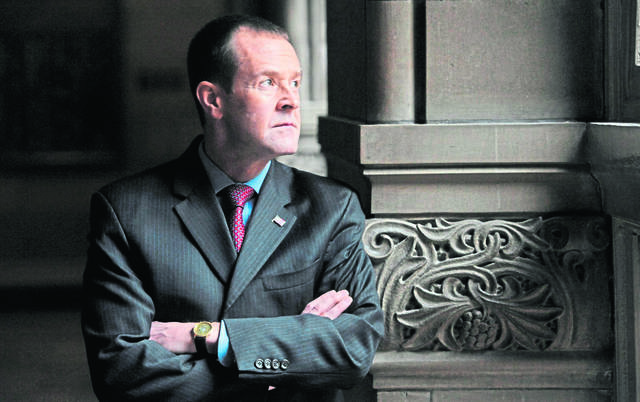Six months after Allegheny County Common Pleas Judge Mark V. Tranquilli was moved to administrative duties after allegations he made racist comments about a criminal court juror, an investigation by the state Judicial Conduct Board is wrapping up.
“Judge Tranquilli has completely and fully cooperated with the investigation, and we anticipate that it will be concluded in short order,” said his attorney, Matt Logue. At that point, he said, the judge will be able to respond to the allegations against him publicly.
In January, following a jury trial in a drug case, Tranquilli became upset by the not-guilty verdict, according to the initial complaint filed with the conduct board.
During a conversation with the attorneys on the case in chambers, the complaint said, Tranquilli criticized the prosecutor for “allowing ‘Aunt Jemima’ on the jury.”
He was referring to Juror No. 4, a young black woman who wore a hair wrap. According to the complaint, Tranquilli also indicated that he believed the woman’s “baby daddy” probably sells drugs and that her bias was the cause of the verdict.
After Tranquilli’s alleged comments were made public, a range of public officials and advocacy organizations called for his resignation.
President Judge Kim Berkeley Clark in early February assigned Tranquilli to hear summary appeals and then issued another order a few days later forbidding him from presiding over any cases and assigning him to administrative duties. He has continued in that role since then.
Last week, several advocacy groups — led by the Court Watch Program run by the Abolitionist Law Center — conducted an online protest against Tranquilli, including posting an op-ed about him on medium.com in which they demand his resignation.
“It’s too important of an issue to let it trail off — especially with what’s going on in the world with respect to police brutality and state violence,” said Autumn Redcross, the director of the program.
The online campaign included posting on Twitter and Instagram, Redcross said, as well as doing a fax, phone and email blast. It also included collecting signatures on a petition to have Tranquilli removed from the bench. Other groups involved included Casa San Jose, the Human Rights Coalition and the Women’s March on Washington – Pittsburgh.
Tracy Baton, who heads the Women’s March group, criticized the lack of transparency in the Judicial Conduct Board’s investigative process.
“The process is intentionally opaque,” she said. “It wasn’t meant for us.”
Richard Long, chief counsel for the board, said it receives 800 complaints about judges each year, and the vast majority are dismissed. When that happens, no information is released to the public, and the judge who was the target of a complaint only receives notice that a complaint was unfounded.
Regarding Tranquilli, Long said he could not confirm or deny that there even is an investigation. However, attorneys involved in the case have confirmed they were interviewed by a board investigator who was a retired FBI agent.
“The rules of the process require confidentiality at this point,” Logue said.
The board’s work over the past several months was somewhat impacted by the pandemic, Long said.
“There’s no time restriction on how long it takes to perform an investigation,” he said.
Baton said she believes that, as the Black Lives Matter movement gains momentum, it is time for the justice system to respond.
“If that’s what he thinks of decent citizens who pay their busfare to do jury duty, how can he hold the idea that black defendants are innocent until proven guilty?” she asked. “How can he possibly offer justice to black lives?”
Baton said Tranquilli should be removed from the bench, and that sensitivity or diversity training would be inadequate.
“He articulated systemic racism and encapsulated it in that one sentence,” she said.
She questioned, too, what Tranquilli’s administrative duties have been over the last six months.
Without being able to preside over cases, Tranquilli would be limited to primarily keeping up with case law, said Bruce Antkowiak, who chairs the criminology department at Saint Vincent College. He also could be assigned tasks by the president judge, for example, reviewing data for reports or preparing for conferences.
Common Pleas Court judges in Pennsylvania earn $186,665 annually.
“It’s unacceptable for him to be on vacation at $100,000 in taxpayer money,” Baton said. “He is going to cost a fortune.”
Tranquilli, a long-time homicide prosecutor in the district attorney’s office, was elected to the court in 2013. He served for four years in the family division before moving to the criminal court in January 2018.
Under the Judicial Conduct Board process, once an investigation is concluded, the board may either dismiss the complaint. If it finds there is clear and convincing evidence of judicial misconduct, it may file formal charges against the judge with the Court of Judicial Discipline. At that stage, the information becomes public.
There, the court will hold a hearing, in which counsel from the Judicial Conduct Board serves as prosecutor. At the conclusion, the court must decide whether to impose sanctions. Penalties can range from reprimand, to suspension with or without pay, to removal.








